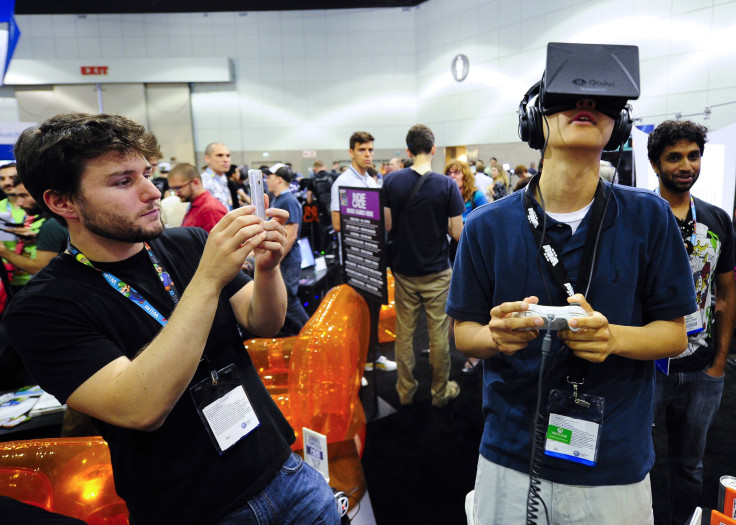Selling Out Can Be Good: Why Facebook's Acquisition Of Oculus Will Help VR Gaming

Plenty has been written about the negative public reaction to Facebook Inc. (NASDAQ:FB) dropping $2 billion for Oculus VR, the maker of a virtual reality gaming headset called Oculus Rift. As I wrote on Wednesday, everyone from Wall Street investors to anonymous gamers criticized the purchase during the first 24 hours of its announcement.
Wall Street since then has warmed up a bit to the deal, and Facebook shares have slightly recovered, but video gamers have continued their vocal opposition. Some early backers who helped the company raise $2.4 million through crowd funding felt betrayed.
The general consensus was that not only had Oculus Rift sold out, but that it also had sold out to Facebook. Goodbye video games; hello immersive advertising platform.

Yet, very few of the criticisms hold up well when put to the test. If someone really wants to play virtual reality games in their home as soon as possible, a multibillion dollar investment is just about the best possible thing could have happened to Oculus.
Let’s start with some of the facts. When Facebook made the announcement, it clearly stated that Oculus will maintain its headquarters in Irvine, Calif., operate independently and continue developing Oculus Rift.
“Immersive gaming is the first big opportunity and Oculus already has big plans here that won’t be changing,” Facebook CEO Mark Zuckerberg said during a webcast to discuss the acquisition. “We’re going to focus on helping Oculus build out their product and develop partnerships to support more games and accelerate their plans.”
Yes, Zuckerberg went on to discuss ways that Oculus VR technology can be used for social networking, and yes, users are right to be skeptical of a company built on advertising. But is there any reason to doubt that Facebook genuinely wants to support video gaming?
In a Q&A with investors, Zuckerberg claimed that gaming takes up 40 percent of the time people spend on computers and mobile devices. Facebook doesn’t breakdown how much revenue it makes directly from gaming, but it made about $7 billion last year from advertising and only $900 million in “payments and other fees.” Most of that $900 million comes from Facebook games.
Games present Facebook with a huge opportunity to grow and diversify its revenue. Facebook is already set up to deliver gaming across nearly any platform, and Facebook engineers last week told attendees at the Game Developers Conference in San Francisco that it is planning to focus more on cross-platform games this year.
Games also increase user engagement with the Facebook platform, which increases Facebook’s appeal to advertisers and boosts its primary revenue stream.
With this in mind, it makes complete business sense for Facebook to stay out of the way and let Oculus continue developing. There's plenty of reason to expect more than just “FarmVille VR Edition.”
From Oculus's point of view, allying with a social network makes sense, and its strange that gamers are so averse to the idea. Online gaming is more popular than ever. For instance, the “social” button was one of the most celebrated features of the Sony PlayStation 4. At one time, a social version of Pokemon attracted as many as 70,000 gamers at Twitch.tv, a website built around letting users watch online video game play while chatting about it.
Facebook eliminated the need for Oculus to build its own Xbox Live or PlayStation Plus by giving it access to the infrastructure behind the largest social network on earth. When Google purchased Nest Labs in January for $3.2 billion (which inspired fear that the search giant would turn the domestic products into a spy network), it allowed the company to focus on development rather than worry about infrastructure and meetings with investors.
“Facebook brings greater scale with unique resources and capabilities that accelerate virtual reality’s future,” Oculus CEO Brendan Iribe said in a statement.
“By opening doors to new partnerships, helping to develop the core functionality of our product and supporting us recruiting, marketing and infrastructure, the Oculus team can focus on doing what we do best: solving hard problems and delivering on the dream of virtual reality.”
Iribe said gamers should also be excited about another often-overlooked Facebook project: Open Compute. The goal of Open Compute is to develop network infrastructure at the lowest possible cost, and all technologies are released to the public for free. This lines up with Oculus’s goal of creating a low cost VR platform and should alleviate fears that Facebook plans to completely redesign Oculus Rift and restrict what developers can do with development kits.
Finally, there's precedent for a nongaming tech company finding success by releasing new video game platforms. In the early 1990’s, the gaming community mocked Sony for wanting to introduce a video game console and did the same to Microsoft a few years later. The Sony PS4 and Microsoft Xbox One now dominate the console gaming world, Nintendo struggles in third place, and Sega gave up on producing consoles more than a decade ago. Facebook could end up becoming the next big video game powerhouse.
So hold your head up, disappointed gamers. You may not be happy that your Kickstarter dollars helped create a Facebook project, but there’s plenty of reason to believe that VR gaming will arrive sooner than anyone imagined just a few days ago.
© Copyright IBTimes 2025. All rights reserved.






















